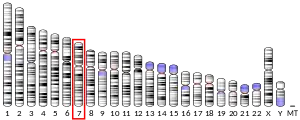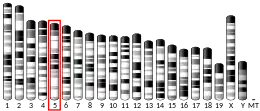UFSP1
UFM1 specific peptidase 1 (inactive) is a protein that in humans is encoded by the UFSP1 gene.[5]
| UFSP1 | |||||||||||||||||||||||||||||||||||||||||||||||||||
|---|---|---|---|---|---|---|---|---|---|---|---|---|---|---|---|---|---|---|---|---|---|---|---|---|---|---|---|---|---|---|---|---|---|---|---|---|---|---|---|---|---|---|---|---|---|---|---|---|---|---|---|
| Identifiers | |||||||||||||||||||||||||||||||||||||||||||||||||||
| Aliases | UFSP1, UFSP, UFM1-specific peptidase 1 (inactive), UFM1 specific peptidase 1 (inactive) | ||||||||||||||||||||||||||||||||||||||||||||||||||
| External IDs | OMIM: 611481 MGI: 1917490 HomoloGene: 80245 GeneCards: UFSP1 | ||||||||||||||||||||||||||||||||||||||||||||||||||
| |||||||||||||||||||||||||||||||||||||||||||||||||||
| |||||||||||||||||||||||||||||||||||||||||||||||||||
| |||||||||||||||||||||||||||||||||||||||||||||||||||
| |||||||||||||||||||||||||||||||||||||||||||||||||||
| |||||||||||||||||||||||||||||||||||||||||||||||||||
| Wikidata | |||||||||||||||||||||||||||||||||||||||||||||||||||
| |||||||||||||||||||||||||||||||||||||||||||||||||||
Function
This gene encodes a protein that is similar to other Ufm1-specific proteases. Studies in mouse determined that Ufsp1 releases Ufm1 (ubiquitin-fold modifier 1) from its bound conjugated complexes which also makes it into an active form. Because the human UFSP1 protein is shorter on the N-terminus and lacks a conserved Cys active site, it is predicted to be non-functional.[provided by RefSeq, Nov 2009].[5]
References
- GRCh38: Ensembl release 89: ENSG00000176125 - Ensembl, May 2017
- GRCm38: Ensembl release 89: ENSMUSG00000051502 - Ensembl, May 2017
- "Human PubMed Reference:". National Center for Biotechnology Information, U.S. National Library of Medicine.
- "Mouse PubMed Reference:". National Center for Biotechnology Information, U.S. National Library of Medicine.
-
"Entrez Gene: UFM1 specific peptidase 1 (inactive)". Retrieved 2020-04-15.
 This article incorporates text from this source, which is in the public domain.
This article incorporates text from this source, which is in the public domain.
This article incorporates text from the United States National Library of Medicine, which is in the public domain.
This article is issued from Wikipedia. The text is licensed under Creative Commons - Attribution - Sharealike. Additional terms may apply for the media files.



